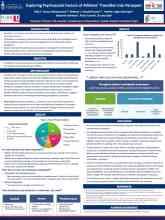Despite the benefits of participating in parasport and the growing acceptance of parasport for individuals with physical disabilities, there remain challenges with the uptake of parasport participation at both the individual and societal levels. The present study explored, from the perspectives of elite parasport athletes, psychosocial factors associated with transitioning into parasport. Participants were recruited from a variety of Provincial Sports Organizations across Canada and completed the Parasports Transition Questionnaire which targeted factors relating to disability background, age of onset of parasport, social support, motivations to engage in parasport, and barriers to initiating and maintain participation in parasports. Results of the study indicate that the majority of athletes were competing at the elite level in the same parasport that they were first introduced to as novices; health care professionals and coaches were the primary influences of first exposure to parasports; coaches played an integral role in the parasport experience; the biggest obstacle for initiation and continued participation was lack of available resources (i.e., locating a program, facility, equipment, or qualified coach).
A poster was presented at the VISTA conference in Toronto:
Arbour-Nicitopoulos KP, Bassett-Gunter R, Sprenger H, Sylvester B, Camick K, Goss J. Exploring psychosocial factors of athletes’ transition into parasport. Poster presentation presented at the VISTA conference, September 21st, 2017. Toronto, Canada

